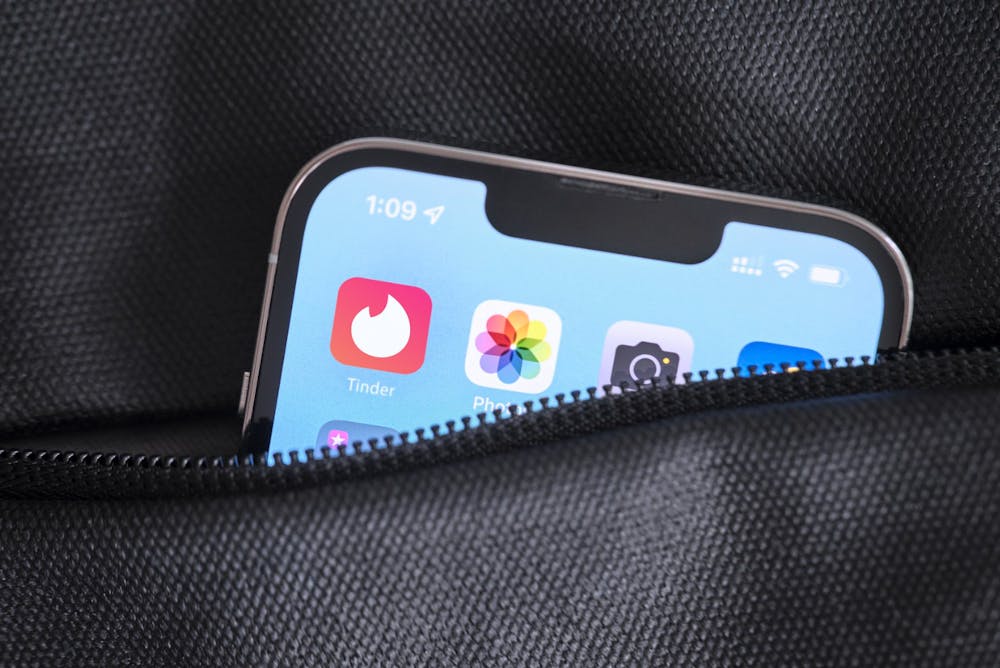By Corinne Coakley
Correspondent
My now year-long relationship began with a simple message: “Hey!! What’s it like being an environmental scientist??” Perhaps it was my interest in his passion or my excessive use of punctuation, but either way, a spark soared through the digital Bumble airwaves. A year later, we thank Bumble for bringing the two of us together, via swipes and bright yellow screens.
However, my online dating experience was not filled with fruitful dates and positive, interesting conversations. On one of these dates, I was bombarded with angry rantings and sexually explicit comments at a Panera. On another, I was asked how many kids I want, on the first date, and told extensively about the importance of bible study.
Like most users, I’ve experienced ghosting, as the ghoster and the ghostee, along with the awkward in-person encounter with a person you’ve only talked to on an app. On the whole, my online dating experience was fun and exciting, as well as frustrating, as I was immersed into the technologically-facilitated patriarchy.
Today, according to a study on online dating by the Pew Research Center, three in ten adults have used a dating app at some point in their lives. For younger adults, this number is even more significant: 48% of 18-29 year olds have used a dating app. This suggests that dating apps are highly popular on college campuses where high concentrations of late teens and early 20-year-olds reside.
Since many individuals resort to the digital world to make romantic connections, the entire basis of romance has changed. Where people once met in class, at bars or through friends and family, they are now meeting on their mobile devices.
Like in most areas of society, gender differences pervade on dating apps. For starters, men and women differ in their motivations for using these apps. According to new data from YouGov, men (36%) are more than twice as likely as women (14%) to report using dating apps for casual sex. Men and women also differ in their level of satisfaction with their online dating experience: 57% of men who have used dating apps in the past five years say they did not get enough messages, compared to only 24% of women. This is likely due to the extremely unbalanced gender ratio. For example, only 21.9% of Tinder users are women while 78.1% are men.
However, the most troubling gender difference relates to sexual harassment. Women are far more likely to experience sexual harassment on dating apps than men. According to the same Pew Research Center study, 57% of women between the ages of 18-34 report that they have received unsolicited and sexual images and/or messages, compared to 28% of men in the same age range. Additionally, 60% of women in that age group say that another user continued to contact them after saying they weren’t interested, compared to 27% of men.
So, has online dating simply created yet another platform for sexual harassment and trauma?
Based on the majority of my own experiences, I would say yes. Toxic dating thrives on Tinder, Bumble and Hinge, where users can send offensive messages without much risk of consequence. In the virtual dating world, it’s almost like the other users don’t quite feel real until you meet in person. This disconnect from reality creates a platform where people feel free to judge, harass and send unsolicited photos without any concern for the impact. Superficiality also thrives with the colossal importance of good photos. Like on other social media platforms, living up to beauty standards to impress others feels like a necessity.
Even with all of this, one can’t deny the possible positive outcomes. 12% of Americans who have used a dating app at some point in their lives have married or been in a committed relationship with someone they met online. And I am now a part of that group. Though we may be the exception, online dating has the potential to bring compatible people together who never would have met in the non-virtual world. Perhaps this possible reward is worth all the frustration that comes along the way.
Online dating doesn’t have to mean the end of traditional romance. With thoughtful swipes and beyond surface-level conversations, you can find someone with whom you want to do all the cheesy, romantic things: like dressing up for fancy dinners at restaurants where the menu is written in Italian and you have to ask the waiter what everything is, reading books over mugs of coffee, hiking and stopping to eat pistachios on a cozy boulder. Traditional romance is not dead, it just begins differently, and if we do the online part right, we can have everything we envision and desire in a relationship.







